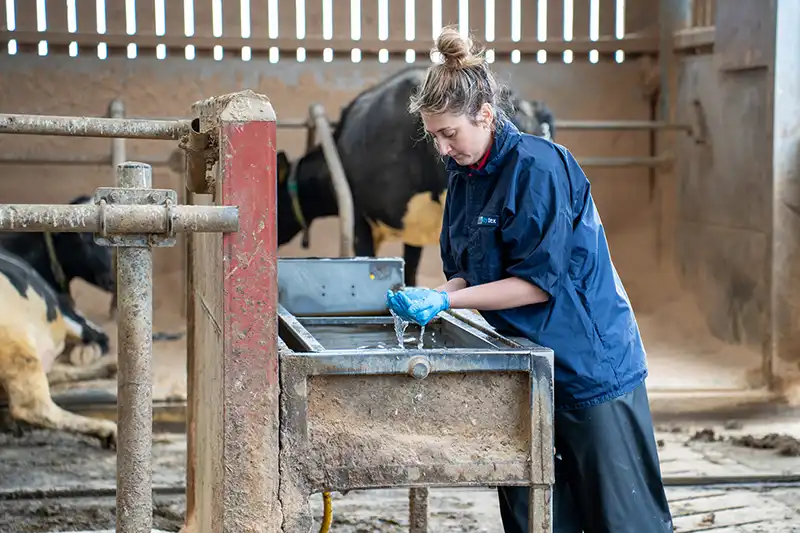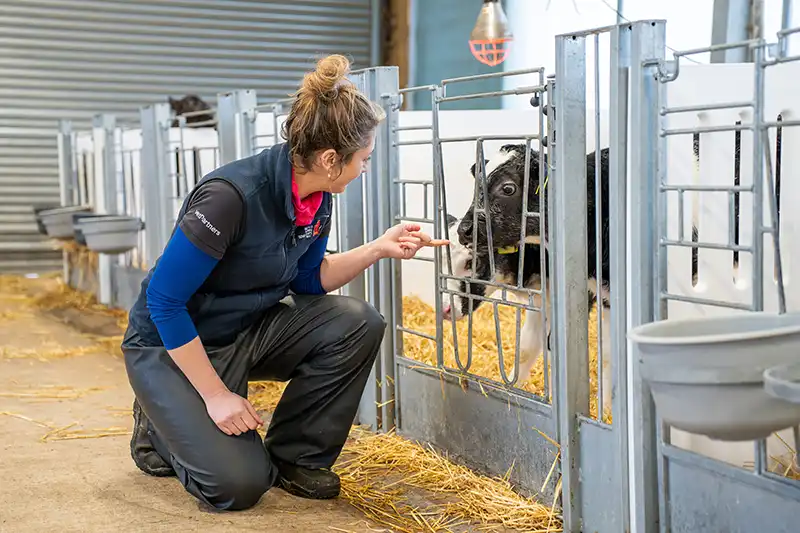5 Aug 2025
Having recently completed her Nuffield Farming Scholarship, Hannah Batty, clinical director and vet at LLM Farm Vets in Shropshire – part of the VetPartners group – outlines how she hopes her findings will help the dairy sector

Hannah Batty
Having recently completed her Nuffield Farming Scholarship, Hannah Batty, clinical director and vet at LLM Farm Vets in Shropshire – part of the VetPartners group – outlines how she hopes her findings will help the dairy sector.
A My main role is farm clinical work first and foremost – it’s what I’m passionate about and what I enjoy – but I’m also heavily involved in the management of people within the Whitchurch practice and the LLM business itself.
This can include things like managing our vet tech team, making strategic decisions for the business, looking at how we can continue to support our farmers and help develop their businesses, and spotting opportunities for training and new products. I’ve been out of vet school for 11 years and I’ve been involved in management for the past six years.
At [the University of] Nottingham vet school, I enjoyed every single area of study, and it was only in the last six months of my degree that I decided to specialise in farm vetting. This is because as a farm vet, I felt you could make a difference to the individual animal, the whole herd and also to the farm business.
A Nuffield scholarships are all about leading positive change in agriculture. Rather ambitiously, I first applied to do one when I was a year out of vet school. I loved the idea of challenging myself, broadening my horizons of global agriculture and being able to bring back new ideas to support our clients. Although the panel correctly identified it was a bit too soon, I still had the idea in the back of my mind.
I then successfully reapplied in July 2023, for the same reasons as all those years ago. The studies are a mixture of scientific and people research, and they are designed to support the scholar on a personal development journey to help them contribute positively to agriculture.
A The application process involves asking and creating a question that you believe is important and pertinent to British agriculture.
For me, that boiled down to people, processes and potential, with the aim of creating a blueprint for great team management on UK dairy farms. As a vet, you go on a lot of farms where you see health challenges, but you may also see people management challenges. I often hear about business challenges on farm that are similar to those I’ve been exposed to as a clinical director.
I have a theory: happy cows mean happy people, and happy people mean happy cows. I wanted to do the scholarship so I could go and explore this and come up with some tips, tricks and tools for dairy farmers, to help them make their places of work happier, more fulfilling and more successful for the people as well as the animals.
I do believe you see animal health benefits if you’ve got people on the right track, doing things correctly.
I was very fortunate to have been awarded the scholarship in October 2023 with sponsorship from The Trehane Trust, which has been created to further the development of the dairy industry.
I have completed my travels – Australia, including Tasmania, Netherlands, Italy, Brazil, Chile, Scotland and Ireland – and I recently wrote and presented my report at the Nuffield annual conference in Belfast in November 2024.
A They’ve been incredibly supportive of me doing the Nuffield scholarship, because they knew it would benefit me, our clients and the practice. As a result, I have been allowed extra leave from the practice – similar, for example, to what is agreed for the diploma in bovine reproduction – and was given the chance to share my ideas on return from my travels.

A I believe this starts with thinking, why are we here, who’s within my team, and how will we achieve our end goal?
To be successful, you must all know what the goal is; otherwise, why are you all there? Articulating this clearly and sharing it in with the team will get buy in and build a shared sense of purpose.
Secondly, understanding who is in your team and how they work is fundamental, but even more importantly is recognising who you are. You really need to understand yourself first. This might sound counterintuitive, but if a leader doesn’t have a strong sense of self and the ability to appreciate how they communicate and interact with people, they might end up offending team members unintentionally or communicating things in the wrong way.
This is why I like to talk about different personality types and use personality training. I advocate for the “birds personality test”, which uses analogies of characteristics of the dove, owl, peacock or eagle (a model known as DOPE) to understand why people interact the way they do; for example, a peacock personality is like me: really excited and enthusiastic. An owl character will tend to be more data driven, or a dove is someone who wants harmony within a team and will do anything to keep the peace. An eagle trait would be driven, motivated by key performance indicators and keen to get the job done.
Finally, think about how you are going to achieve your goals, starting with the desired outcome, as opposed to the process first. I say this as a vet who has written loads of detailed and beautifully laminated protocols. Getting a team on board with a desired outcome and then asking them to help come up with the solutions or protocols will get much better buy in and commitment.
Lastly, and I know it sounds obvious, but I’ve found that it’s vital to make time to talk.
People management doesn’t just happen naturally, and particularly now farms are typically getting bigger, we’ve got to create time to talk and enable us to have these conversations that build trust. This will allow us to be open, problem solve and to find solutions.
A I have shared a lot of what I have learned with farm colleagues across VetPartners, and I’ve also managed to generate some extra consultancy work for myself, as well as being able to share tips with farmers – that’s obviously the key bit.
The whole point of doing the scholarship has been to help support our dairy farmers with people management; as an example, this includes helping them come up with team appraisal forms that they can use to do a really useful review of the team to support them most.
Following my scholarship, we’re also hoping to run a farm management people skills workshop series with clients and create discussion groups to support them.

A The future of farm vetting is changing, and being able to diversify our income streams and offer support to farmers that is readily accessible and understandable is important.
I think farming has potentially been behind other industries in terms of how it has supported its employees through tools such as carrying out thorough inductions, carrying out appraisals or developing team members.
But if we want to recruit and retain good people in the industry, we need to get better at this support.
There’s a real opportunity for people, including vets, who are skilled in this area to offer advice to farmers. It’s nice knowing that sometimes you can go to a farm to solve a cow health problem and then chat about “people health” problems at the same time, which can be quite a nice way of doing it.
At the end of the day, if we don’t have people involved in milking cows, how are we going to milk cows? A lot of people think technology is the answer, but we still need people to look after that technology.
Rather than fearing people management, we need to see it as an opportunity to improve how we communicate and motivate teams.
A I have a dream of ensuring that every dairy farm is a happy place for both people and animals.
I think this is achievable, so for me the future will focus on spreading the message and banging the drum that happy cows and happy people go hand in hand.
I love clinical vetting and absolutely love calving cows and getting stuck into health issues on farms, but I also really enjoy this “whole team” and people management piece. I like looking at how we can creative positive and lasting change on farms, and how to get people engaged.